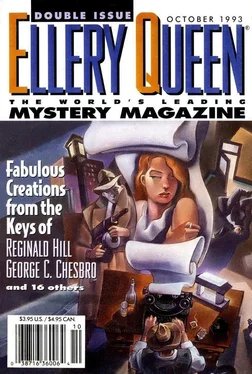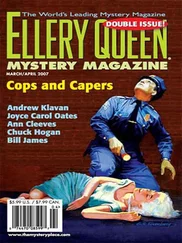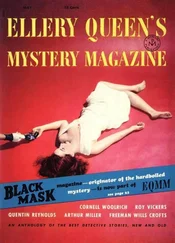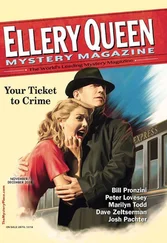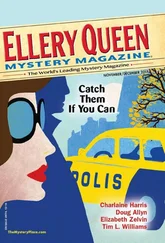Charles Ardai - Ellery Queen’s Mystery Magazine. Vol. 102, No. 4 & 5. Whole No. 618 & 619, October 1993
Здесь есть возможность читать онлайн «Charles Ardai - Ellery Queen’s Mystery Magazine. Vol. 102, No. 4 & 5. Whole No. 618 & 619, October 1993» весь текст электронной книги совершенно бесплатно (целиком полную версию без сокращений). В некоторых случаях можно слушать аудио, скачать через торрент в формате fb2 и присутствует краткое содержание. Город: New York, Год выпуска: 1993, Издательство: Davis Publications, Жанр: Детектив, на английском языке. Описание произведения, (предисловие) а так же отзывы посетителей доступны на портале библиотеки ЛибКат.
- Название:Ellery Queen’s Mystery Magazine. Vol. 102, No. 4 & 5. Whole No. 618 & 619, October 1993
- Автор:
- Издательство:Davis Publications
- Жанр:
- Год:1993
- Город:New York
- ISBN:нет данных
- Рейтинг книги:3 / 5. Голосов: 1
-
Избранное:Добавить в избранное
- Отзывы:
-
Ваша оценка:
- 60
- 1
- 2
- 3
- 4
- 5
Ellery Queen’s Mystery Magazine. Vol. 102, No. 4 & 5. Whole No. 618 & 619, October 1993: краткое содержание, описание и аннотация
Предлагаем к чтению аннотацию, описание, краткое содержание или предисловие (зависит от того, что написал сам автор книги «Ellery Queen’s Mystery Magazine. Vol. 102, No. 4 & 5. Whole No. 618 & 619, October 1993»). Если вы не нашли необходимую информацию о книге — напишите в комментариях, мы постараемся отыскать её.
Ellery Queen’s Mystery Magazine. Vol. 102, No. 4 & 5. Whole No. 618 & 619, October 1993 — читать онлайн бесплатно полную книгу (весь текст) целиком
Ниже представлен текст книги, разбитый по страницам. Система сохранения места последней прочитанной страницы, позволяет с удобством читать онлайн бесплатно книгу «Ellery Queen’s Mystery Magazine. Vol. 102, No. 4 & 5. Whole No. 618 & 619, October 1993», без необходимости каждый раз заново искать на чём Вы остановились. Поставьте закладку, и сможете в любой момент перейти на страницу, на которой закончили чтение.
Интервал:
Закладка:
“Well, I’d sooner it was him than another.”
“Oh, I don’t know; he ain’t a bad feller, my dear.”
“Maybe not, but in my opinion he’d be none the worse for a bit of a shake-up.”
“Well, if that’s your opinion, it’s my opinion he’s put himself into the way of getting one. Anyhow, we shan’t have no more of it, and that’s something to be thankful for.”
And so Mr. and Mrs. Chittenden sat down to tea.
And what of Mr. Dillet and of his new acquisition? What it was, the title of this story will have told you. What it was like, I shall have to indicate as well as I can.
There was only just room enough for it in the car, and Mr. Dillet had to sit with the driver: he had also to go slow, for though the rooms of the dolls’ house had all been stuffed carefully with soft cotton wool, jolting was to be avoided, in view of the immense number of small objects which thronged them; and the ten-mile drive was an anxious time for him, in spite of all the precautions he insisted upon. At last his front door was reached, and Collins, the butler, came out.
“Look here, Collins, you must help me with this thing — it’s a delicate job. We must get it out upright, see? It’s full of little things that mustn’t be displaced more than we can help. Let’s see, where shall we have it? (After a pause for consideration.) Really, I think I shall have to put it in my own room, to begin with at any rate. On the big table — that’s it.”
It was conveyed — with much talking — to Mr. Dillet’s spacious room on the first floor, looking out on the drive. The sheeting was unwound from it, and the front thrown open, and for the next hour or two Mr. Dillet was fully occupied in extracting the padding and setting in order the contents of the rooms.
When this thoroughly congenial task was finished, I must say that it would have been difficult to find a more perfect and attractive specimen of a dolls’ house in Strawberry Hill Gothic than that which now stood on Mr. Dillet’s large kneehole table, lighted up by the evening sun which came slanting through three tall sash-windows.
It was quite six feet long, including the chapel or oratory which flanked the front on the left as you faced it, and the stable on the right. The main block on the house was, as I have said, in the Gothic manner: that is to say, the windows had pointed arches and were surmounted by what are called ogival hoods, with crockets and finials such as we see on the canopies of tombs built into church walls. At the angles were absurd turrets covered with arched panels. The chapel had pinnacles and buttresses, and a bell in the turret and coloured glass in the windows. When the front of the house was open you saw four large rooms, bedroom, dining room, drawing room, and kitchen, each with its appropriate furniture in a very complete state.
The stable on the right was in two storeys, with its proper complement of horses, coaches, and grooms, and with its clock and Gothic cupola for the clock bell.
Pages, of course, might be written on the outfit of the mansion — how many frying pans, how many gilt chairs, what pictures, carpets, chandeliers, fourposters, table linen, glass, crockery, and plate it possessed; but all this must be left to the imagination. I will only say that the base of plinth on which the house stood (for it was fitted with one of some depth which allowed of a flight of steps to the front door and a terrace, partly balustraded) contained a shallow drawer or drawers in which were neatly stored sets of embroidered curtains, changes of raiment for the inmates, and, in short, all the materials for an infinite series of variations and refittings of the most absorbing and delightful kind.
“Quintessence of Horace Walpole, that’s what it is: he must have had something to do with the making of it.” Such was Mr. Dillet’s murmured reflection as he knelt before it in a reverent ecstasy. “Simply wonderful! This is my day and no mistake. Five hundred pound coming in this morning for that cabinet which I never cared about, and now this tumbling into my hands for a tenth, at the very most, of what it would fetch in town. Well, well! It almost makes one afraid something’ll happen to counter it. Let’s have a look at the population, anyhow.”
Accordingly, he set them before him in a row. Again, here is an opportunity, which some would snatch at, of making an inventory of costume: I am incapable of it.
There was a gentleman and lady, in blue satin and brocade respectively. There were two children, a boy and a girl. There was a cook, a nurse, a footman, and there were the stable servants, two postilions, a coachman, two grooms.
“Anyone else? Yes, possibly.”
The curtains of the fourposter in the bedroom were closely drawn round all four sides of it, and he put his finger in between them and felt in the bed. He drew the finger back hastily, for it almost seemed to him as if something had — not stirred, perhaps, but yielded — in an odd live way as he pressed it. Then he put back the curtains, which ran on rods in the proper manner, and extracted from the bed a white-haired old gentleman in a long linen nightdress and cap, and laid him down by the rest. The tale was complete.
Dinnertime was now near, so Mr. Dillet spent but five minutes in putting the lady and children into the drawing room, the gentleman into the dining room, the servants into the kitchen and stables, and the old man back into his bed. He retired into his dressing room next door, and we see and hear no more of him until something like eleven o’clock at night.
His whim was to sleep surrounded by some of the gems of his collection. The big room in which we have seen him contained his bed: bath, wardrobe, and all the appliances of dressing were in a commodious room adjoining: but his fourposter, which itself was a valued treasure, stood in the large room where he sometimes wrote, and often sat, and even received visitors. Tonight he repaired to it in a highly complacent frame of mind.
There was no striking clock within earshot — none on the staircase, none in the stable, none in the distant church tower. Yet it is indubitable that Mr. Dillet was startled out of a very pleasant slumber by a bell tolling one.
He was so much startled that he did not merely lie breathless with wide-open eyes, but actually sat up in his bed.
He never asked himself, till the morning hours, how it was that, though there was no light at all in the room, the dolls’ house on the kneehole table stood out with complete clearness. But it was so. The effect was that of a bright harvest moon shining full on the front of a big white stone mansion — a quarter of a mile away it might be, and yet every detail was photographically sharp. There were trees about it, too — trees rising behind the chapel and the house. He seemed to be conscious of the scent of a cool, still September night. He thought he could hear an occasional stamp and clink from the stable, as of horses stirring. And with another shock he realised that, above the house, he was looking, not at the wall of his room with its pictures, but into the profound blue of a night sky.
There were lights, more than one, in the windows, and he quickly saw that this was no four-roomed house with a movable front, but one of many rooms, and staircases — a real house, but seen as if through the wrong end of a telescope. “You mean to show me something,” he muttered to himself, and he gazed earnestly on the lighted windows. They would in real life have been shuttered or curtained, no doubt, he thought; but, as it was, there was nothing to intercept his view of what was being transacted inside the rooms.
Two rooms were lighted — one on the ground floor to the right of the door, one upstairs, on the left — the first brightly enough, the other rather dimly. The lower room was the dining room: a table was laid, but the meal was over, and only wine and glasses were left on the table. The man of the blue satin and the woman of the brocade were alone in the room, and they were talking very earnestly, seated close together at the table, their elbows on it: every now and again stopping to listen, as it seemed. Once he rose, came to the window and opened it, and put his head out and his hand to his ear. There was a lighted taper in a silver candlestick on a sideboard. When the man left the window he seemed to leave the room also; and the lady, taper in hand, remained standing and listening. The expression on her face was that of one striving her utmost to keep down a fear that threatened to master her — and succeeding. It was a hateful face, too; broad, flat, and sly. Now the man came back and she took some small thing from him and hurried out of the room. He, too, disappeared, but only for a moment or two. The front door slowly opened and he stepped out and stood on the top of the perron, looking this way and that; then turned towards the upper window that was lighted, and shook his fist.
Читать дальшеИнтервал:
Закладка:
Похожие книги на «Ellery Queen’s Mystery Magazine. Vol. 102, No. 4 & 5. Whole No. 618 & 619, October 1993»
Представляем Вашему вниманию похожие книги на «Ellery Queen’s Mystery Magazine. Vol. 102, No. 4 & 5. Whole No. 618 & 619, October 1993» списком для выбора. Мы отобрали схожую по названию и смыслу литературу в надежде предоставить читателям больше вариантов отыскать новые, интересные, ещё непрочитанные произведения.
Обсуждение, отзывы о книге «Ellery Queen’s Mystery Magazine. Vol. 102, No. 4 & 5. Whole No. 618 & 619, October 1993» и просто собственные мнения читателей. Оставьте ваши комментарии, напишите, что Вы думаете о произведении, его смысле или главных героях. Укажите что конкретно понравилось, а что нет, и почему Вы так считаете.
